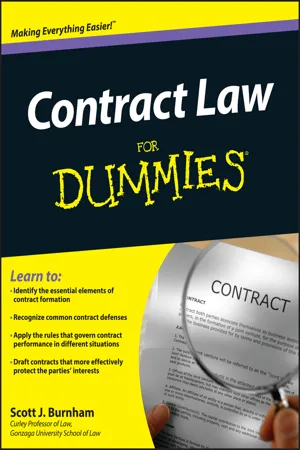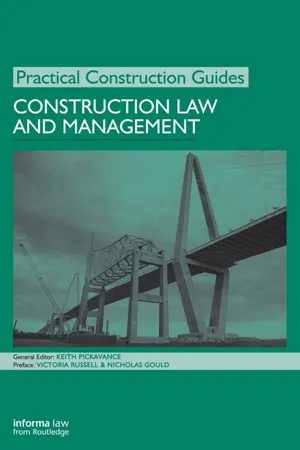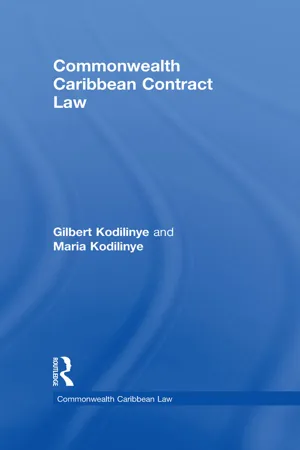Law
Remedies for Breach of Contract
Remedies for breach of contract refer to the legal solutions available to a party when the other party fails to fulfill their contractual obligations. Common remedies include damages, specific performance, and cancellation of the contract. Damages can be compensatory, punitive, or nominal, while specific performance involves requiring the breaching party to fulfill their contractual duties. Cancellation of the contract releases both parties from their obligations.
Written by Perlego with AI-assistance
7 Key excerpts on "Remedies for Breach of Contract"
Learn about this page
Index pages curate the most relevant extracts from our library of academic textbooks. They’ve been created using an in-house natural language model (NLM), each adding context and meaning to key research topics.
- eBook - ePub
Islamic Financial Contracts
A Research Companion
- Hussain Mohi-ud-Din Qadri, Nasir Iqbal(Authors)
- 2021(Publication Date)
- Routledge(Publisher)
15 Remedies for Breach of ContractBreach of contract is generally described as the unjustifiable refusal or failure by one party to a lawful and enforceable contract to implement any of the express or implied duties incumbent on that party under the contract. Usually, a breach occurs by refusing to perform the contract, failing to perform, performing late or performing poorly. Breach of a contract purports the existence of a “lawful and enforceable” contract.There are different remedies in the Western legal system for breach of a contract. The question may arise whether there are Remedies for Breach of Contract available under the Islamic law of contract. The answer is yes.The following remedies are available for breach of contract:- Rescission.
- Damages.
- Specific performance.
- Injunctions.
- Restitutionary remedies.1
15.1 Rescission
The first kind of remedy available is rescission. Islamic law of contract has given the right to rescind the contract to the affected parties when they feel that their rights are at stake. They can use this right by applying the system of options. In a case when it is known to the innocent party that the product sold to him is defected, for example, and may cause damage to him, he can rescind the contract. “Rescission is an equitable right to put an end to a contract and have the status quo restored.”2Zakhaili says:In the words of Joseph Schacht:If the sale is valid, obligatory, free from option and the parties agree to abolish or terminate it, then its cancellation will be by way of rescission. Moreover, rescission, if it is separate from the sale of which is generally consists, will be allowed in all binding contracts, except marriage.3The right of rescission (khiyar , option) is the right unilaterally to cancel (faskh ) or to ratify (imda’ ) a contract, and in particular a contract of sale; if it is not exercised within the proper time limit, the sale is complete (tamm ), with a somewhat different meaning of the term. It can be conferred by law, or agreed upon by the contracting parties. The buyer has the right of rescission at the time at which he sees the object which he has bought, the act of ‘seeing’ not to be taken too narrowly (khiyar al-ru’ya ); also in the case of a defect, i.e. everything that causes a reduction in price among traders (khiyar al-‘ayb ) or lack of a stipulated quality. The defect given only the right of rescission, not of abatement; this last arises only if the return of the object of the sale has become impossible, either by its loss or by the occurrence of a new defect after delivery but before recognition of the first defect (in which case return is possible only with consent of the seller), or by increase in value (such as the dyeing of cloth). If the seller delivered less than the stipulated quantity, the buyer has the choice between rescission of the sale and abatement of the price in proportion.4 - eBook - ePub
- Keith Owens(Author)
- 2013(Publication Date)
- Routledge-Cavendish(Publisher)
CHAPTER 16Remedies for Breach of Contract
There are three principal Remedies for Breach of Contract. These are:- damages;
- a decree of specific performance; and
- injunction.
DAMAGES
Damages is the common law remedy for breach of contract. It consists of a payment of money. The purpose of damages in the law of contract is to put the injured party in the position he would have been in if the contract had been carried out. In Sunley v Cunard White Star (1940), D agreed to carry a machine belonging to P to Guernsey. However, the machine was delivered a week late. P were not able to show that they had an immediate use for the machine and were, therefore, not able to show that they had lost any profit. Held: P were entitled to £20, representing one week’s depreciation of the machine, and the sum of £10 as interest on the capital cost.Nominal damages
Liability for breach of contract does not depend (as some torts do) on the fact that the plaintiff has suffered damage. However, if the plaintiff has suffered no damage as a result of the breach, he will be awarded only nominal damages (that is, a conventional sum, say £2). In Staniforth v Lyall (1830), the charterer of a ship failed to load it. Employment was found for the ship elsewhere at no loss. Held: P was entitled to nominal damages only.In addition to being awarded only nominal damages, the plaintiff may well be ordered to pay all or part of his own costs, though the normal rule is that costs are awarded against the losing party.Punitive damages
As the name suggests, these damages have a punitive element. In English law, such damages are not awarded for breach of contract.General damage
This consists of items which are not precisely quantifiable and must be left to the court to assess. Thus, pain and suffering, loss of amenities, disappointment, injured feelings or inconvenience are general damages. Loss of future earnings (that is, after the court case), loss of future profits, etc, are also general damages. - eBook - ePub
- Scott J. Burnham(Author)
- 2011(Publication Date)
- Wiley(Publisher)
Part V Exploring Remedies for Breach of ContractIn this part . . .This part deals with Remedies for Breach of Contract. The goal is to give the damaged party the expectancy — the financial equivalent of what the party reasonably expected to receive from the performance of the contract. Although that seems easy enough, the actual calculations sometimes become complex, and contract law places certain limitations on remedies according to the principles of causation, certainty, foreseeability, and mitigation.The chapters in this part explain how the courts generally calculate damages in the common law and the UCC and then examine different remedies, including unwinding the contract through rescission, reforming the contract, and settling the dispute via alternative dispute resolution (ADR).Passage contains an image
Chapter 16 Examining How Courts Handle Breach of Contract In This ChapterUnderstanding the concept of contract remediesApplying the rule of the expectancyLooking at the ways courts may limit damages for breachEstimating reliance and restitutionWhen a party fails to perform (do what he promised to do), resulting in breach of contract, the courts strive to exact justice by awarding the non-breaching party a remedy. Courts are vigilant to ensure that the non-breaching party is compensated, but not overcompensated, for the breach. Therefore, courts don’t award punitive damages for breach of contract, because punitive damages don’t compensate for a loss. Courts compensate the non-breaching party in three ways:Expectancy: - eBook - ePub
- Keith Pickavance(Author)
- 2013(Publication Date)
- Informa Law from Routledge(Publisher)
CHAPTER 10 REMEDIES FOR BREACH Julian Critchlow INTRODUCTIONWhere one party breaches his legal obligations to another, the injured party may be entitled to any of a number of forms of relief. Often, the parties will agree their own remedies. As to the common law position, the entitlement to damages is prominent. Where the parties are in contract, termination, repudiation, or rescission may also be options. Sometimes, an injunction will be available. The obligation breached may have its foundation in contract, tort, or statutory duty. Even where no obligation has been breached, if one party performs services for another at his request, an entitlement to be paid a reasonable sum is likely to arise. This chapter considers each of the above while concentrating on damages for breach of contract.FINANCIAL REMEDIES AGREED BY THE PARTIESAs a general rule, the parties to a contract may themselves determine the remedies applicable in case of breach. In construction contracts, the standard forms make express provision. Such remedies may include termination, which is discussed later. They may also include financial entitlements, such as the grant of an express right to the employer to obtain liquidated damages for late performance by the contractor, or a contractor’s right to recover loss and expense for employer default.Liquidated damagesThe overwhelming majority of standard form contracts and, indeed, bespoke contracts, entitle the employer to liquidated damages where the contractor fails to complete the contract works by the time stipulated. The contractor’s delays must be culpable, i.e. delays that are his responsibility and for which he is not entitled to an extension of time. Typically, damages will be expressed as an amount per day, although sometimes an amount per week is stated.The advantage of providing for liquidated damages is that they obviate the employer’s necessity to prove the actual losses he has suffered in the event of delay. Thus, the damages that will typically be incurred by a developer will include the costs associated with being unable to sell the development so that he is kept out of his money, and the additional cost of financing the works. Establishing quantum of such costs can be an uncertain process. A pre-agreed figure for liquidated damages can greatly reduce that uncertainty. - eBook - ePub
- Gilbert Kodilinye, Maria Kodilinye(Authors)
- 2013(Publication Date)
- Routledge(Publisher)
Chapter 14 Remedies for Breach of ContractDOI: 10.4324/9780203488645-14The appropriate remedy for a particular breach of contract will depend on the subject matter of the contract and the nature of the breach. In some cases, more than one remedy may be available. In all cases, the claimant must state in his pleadings the remedy or remedies he is seeking. The possible remedies are:- Action for unliquidated damages.
- Action for liquidated damages.
- Action for damages by way of recovery of a specific sum of money owed under a contract, for example for the agreed price of goods or services under sale of goods legislation.1
- Action for a reasonable price for goods sold, under sale of goods legislation, where the price is not fixed by the contract.2
- Action on a quantum meruit.
- Action for specific performance.
- Action for an injunction to restrain breach of a negative term in a contract.
1 Section 48, Sale of Goods Act (Jamaica); s 49, Sale of Goods Act, Ch 337 (The Bahamas); and s 49, Sale of Goods Act, Cap 393 (Antigua and Barbuda).2 Section 9, Sale of Goods Act (Jamaica); s 10, Sale of Goods Act, Ch 337 (The Bahamas); and s 10, Sale of Goods Act, Cap 393 (Antigua and Barbuda).Unliquidated Damages
The purpose of an award of unliquidated damages is primarily to compensate the claimant for the defendant's breach of contract. Such damages are thus known as ‘compensatory’. The court may award substantial damages, which are intended to place the claimant in the position he would have been in, had the contract been performed by the defendant, or nominal - eBook - ePub
- Max Young(Author)
- 2009(Publication Date)
- Routledge(Publisher)
Remedies for Breach of Contract CONTENTS13.1Introduction13113.2Breach of contract13213.3Discharge at option of the injured party13213.4Damages for breach of contract13313.5Compensatory nature of damages13413.6Duty to mitigate damage suffered13513.7Penalty clauses and liquidated damages13513.8Rules for ascertaining whether penalty or liquidated damages13513.9Limiting sum13613.10Summary13813.1 IntroductionThis chapter deals with what is meant by breach of contract and what are the effects of such a breach. We will see that not every breach of contract entitles the injured party to treat the contract as at an end and that in certain cases the injured party will have to go on with the contract and settle for monetary compensation – damages. In this chapter we will revisit conditions and warranties because the remedy available to the injured party will depend on what type of term has been broken. We will see that although damages are the normal remedy available to the injured party in certain cases the injured party will be able to treat the breach of contract by the other party as bringing the contract to an end. This chapter also shows that in order to get damages it must be shown that the loss was caused by the breach i.e. the loss must not be too remote. Finally, this chapter will show that damages are compensatory in nature and are not punitive or exemplary and in this context we will distinguish between penalty clauses and liquidated damages. - B.S. Patil, S.P. Woolhouse(Authors)
- 2019(Publication Date)
- CRC Press(Publisher)
10Breach of Contract
10.0 IntroductionA breach of a contract is failure to perform an obligation arising out of the contract. Where there is failure to perform an obligation, in whole, it is a total breach. When an agreement is broken only in part it is a partial breach. If a party announces, before his performance is due, his definite unwillingness or inability to fulfil the contract, he thereby admits he is guilty of a breach. The breach in such a case is called an anticipatory breach. Occasionally a party may deliberately incapacitate himself or render impossible the performance of his contract duties; or may so interfere to render performance by the other party impossible. Such tactics also constitute a breach of contract.Every breach of a contractual obligation confers upon an injured party a right of action. However, there are a number of valid excuses for non-performance of contractual obligations. An actionable breach of contract, therefore, occurs when a promisor, without sufficient excuse or justification, fails to perform in accordance with the dictates of his agreement.Further, there is a distinction between breach of a contract and termination of a contract. When a contract comes to an end it is said to be terminated. Breach of contract may constitute a means of contract termination. However, there are a number of ways other than a breach by which a contract can be terminated. Full and satisfactory performance by both sides is the usual mode. The other modes include:- Release under seal
- Rescission by consent of parties
- Accord and satisfaction
- Exercise of option given to a party in a contract to terminate under certain circumstances or events
- Rescission by a party on account of repudiation or non-performance by the other party
- Frustration or impossibility of performance
It may be noted that many common forms of breach of important contract conditions are dealt with in their appropriate places in different chapters in this book. The law applicable to some forms of breach of contracts not dealt with elsewhere in the book is considered in this chapter.






